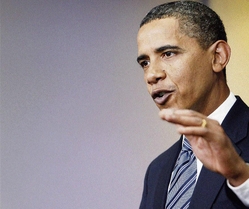Bible Bible to the rescue - 'Woe is me' to those who miss the rhetoric
Published: Wednesday | December 2, 2009

OBAMA
CLEVELAND, Ohio (AP):
"Woe is me: If you want to be all things to all people, remember that many are called but few are chosen."
If those phrases have a familiar ring, they come from a very old book: they have entered the secular lexicon from the Bible.
In the United States, the left-right culture wars have heightened the use of such biblical phrases as rivals try to invoke heavenly punch and challenge their listeners' Bible IQ.
For one, President Barack Obama has said that opponents of his health-care proposals are "bearing false witness" against his ideas, recalling the commandment against lying without accusing critics of being liars.
That gave Obama's rhetoric a dose of divine imperative, according to Timothy Beal, a college religion professor who has written a book connecting popular references to biblical stories. Biblical Literacy: the Essential Bible Stories Everyone Needs to Know was published in October.
"I think you can't be culturally literate without being biblically literate," Beal said in an interview in his snug, book-lined office at Case Western Reserve University in Cleveland.
"These biblical stories and even images are pervasive in our language. They are all over our culture, from high culture to low culture, from Michelangelo to the Simpsons."
Beal believes people who are unfamiliar with these or other biblical references in everyday life are missing a lot.
"When we don't know these stories, when we don't hear these resonances, and we're not familiar, we're really missing half the conversation," said Beal, who has written 10 books and teaches Bible literature and the method and theory of the study of religion.
Following the Gospel
In the big health-care debate in Washington, Beal has watched both sides invoke "the least of these," from the story in Matthew's Gospel, in which Jesus says, anyone who helps those in need is helping the Lord. The message: Those who support health-care proposals helping "the least of these" are following the Gospel directive.
"The debate is over who are 'the least of these?' Is it the elderly? Is it children? Is it the uninsured children? The uninsured? The immigrants?" Beal asked.
Beal, a Presbyterian married to a Presbyterian minister, has detected a shift in biblical invocations since Obama succeeded President George W. Bush.
"Generally, the shift is from a more apocalyptic, good-versus-evil, cosmic war kind of language that Bush tended to use to a more moral-obligation, moral-imperative, 'I am my brother's keeper,' 'Take-care-of-the-least-of-these', kind of language," he said.
In the economic meltdown, Beal has seen a prophetic, biblical tone invoking the books of Amos, Isaiah and Micah in condemning predatory lenders who might take advantage of the vulnerable. He cites a project named for the prophet Nehemiah aimed at helping people avoid predatory loans.
His compilation of biblical stories, likely familiar to many exposed to the Bible, include the Tower of Babel, the Great Flood, the Ten Commandments, the Golden Calf, Jonah and the whale, Jesus turning water into wine, Doubting Thomas and Paul's road to Damascus.
There also are familiar phrases such as "Woe is me" (Job); "All things to all people" (1 Corinthians); and "Many are called, but few are chosen" (Matthew's Gospel).
The Bible-challenged may be less familiar with stories about Moses' shining face (Exodus); Jephthah's daughter (Judges); Daniel's fiery furnace (Daniel); and Jesus feeling the power go out of him when a sick woman touches his hem, seeking a cure (Mark).
The hem-touching story inspired gospel-and-soul singer Sam Cooke's song "Touch the Hem of His Garment," retold from the woman's perspective, according to Beal. It was typical of Cooke's soulful love songs and shows why Bible literacy makes a difference for believers and nonbelievers, Beal said.
Given the Bible's position in the wider culture, "An atheist would just as much need to know these stories as a believer and a churchgoer," Beal said.
Even regular Bible readers benefit from a deeper understanding because popular references to Bible stories may give them added insight to the Bible message, Beal said.
Joseph Kelly, a religious studies professor at John Carroll University, called Beal's work scholarly and reliable.
"A lot of people worry that we're sort of losing touch with the roots of the culture because people don't read the Bible," Kelly said.
David Aune, associate professor and chairman of the religion department at Ohio's Ashland University, graded the nation's overall biblical literacy as low and feels Bible reading has declined during the past decade.
Aune blamed the drop on a megachurch trend toward prepackaged PowerPoint sermons instead of Bible-based preaching.
That leaves him, in figurative Bible terms, nodding his head in the pew in agreement with Beal.
"There's hardly a place in Western civilisation where the Bible's influence is not felt, whether it's art, literature, politics, global conflicts, the Middle East today," Aune said.
"So, my sense is that unless people have some basic understanding of the biblical story and a lot of the references in it, they are going to miss quite a bit of what's going on in the world today."







